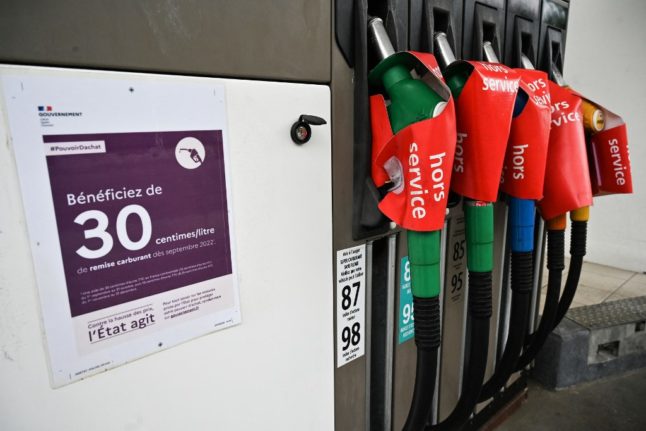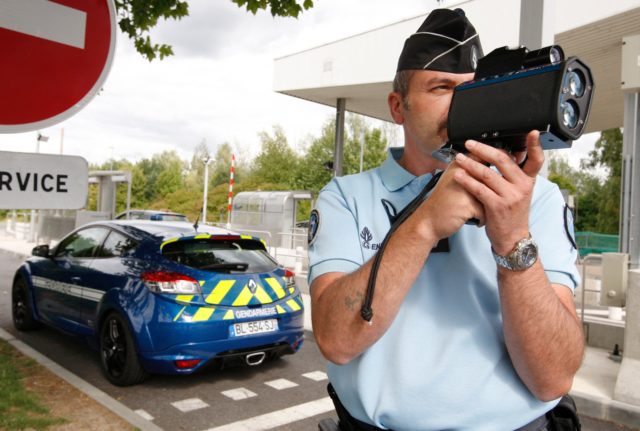French Prime Minister Elisabeth Borne announced on TF1 on Monday that the current 30-cents-per-litre fuel rebate – which helps motorists counter high fuel prices – will be extended past November 1st.
The €0.30 fuel rebate was due to drop to €0.10 on November 1st, but will remain in place “until mid-November” according to the prime minister. Additionally, the company-offered discount of €0.20 by TotalEnergies will also be extended, though the timeline for this was not specified by the prime minister.
Nevertheless, after the fifteen days of extension, the benefit, which is applied directly at the pump, will drop down to €0.10 as intended, and it will end at the end of the year.
The rebate is paid by the government to filling stations, and means that drivers are charged the price including the discount when they pay at the pump.
⛽️ Elisabeth Borne annonce sur TF1 que la ristourne à la pompe de 20 cm/l de Total, censée diminuer de moitié au 1er novembre, va être prolongée jusqu'à mi-novembre.
Idem s'agissant de la ristourne de 30cm/l du gouverment… alors que Bruno Le Maire disait l'inverse jeudi.
1/n pic.twitter.com/XatJL3C1M0
— Nicolas Berrod (@nicolasberrod) October 16, 2022
Finance Minister Bruno Le Maire confirmed on Monday on BFMTV that the benefit would indeed stop in 2023.
“It will not be extended past January 1st, 2023. The 15 day extension [in November] is because there are difficulties in the service stations, which everyone can understand.
Everyone will also understand that we can not continue giving a subsidy to fossil fuels,” Le Maire told BFTMV. He added that doing so would contradict the government’s “decarbonisation objectives” and the “acceleration of the ecological transition.”
The announcements by the prime minister and finance minister came amid ongoing strike action by refinery workers.
On Friday, the CFDT and CFE-CGC unions representing striking workers at TotalEnergies announced they had come to an agreement regarding salary increases – specifically a seven percent pay increase and a bonus between of €3,000 to 6,000, according to France Televisions.
The CGT union, however, refused the offer, opting to continue industrial action.
According to a representative for the CGT, Catherine Perret, the CGT workers are in the majority at oil refineries.
“Between 60 and 80 percent of refinery employees are striking,” Perret told Franceinfo. Additionally, the strike action by CGT employees at refineries has spread to other sectors, with an inter-sector strike protesting the government’s use of worker requisitions. The social movement will occur on Tuesday across France.
READ MORE: Trains, schools and bins: What to expect from Tuesday’s strikes in France
As of Saturday, 27.3 percent of fuel stations were still considered “in difficulty” – that is to say, lacking at least one type of fuel at their station. This is an improvement from earlier in the week, where over 30 percent of fuel stations nationwide remained impacted by shortages.
Specifically, the areas that remained most impacted were Hauts-de-France, the Paris region, and Centre Val de Loire, according to the Minister of Environment Agnès Pannier-Runacher.
The minister specified that 22 percent of stations in Hauts-de-France, 39.9 percent in the Paris region, and 36.4 percent in Centre Val de Loire were still experiencing shortages as of Saturday.
“In response to ongoing strike action, the Prime Minister Borne also threatened new requisitions of employees, in the case of “very strained situations.”
She added during the interview with TF1 that continued mobilisation by TotalEnergies employees was “unacceptable” and asked strikers “not to block the country”.



 Please whitelist us to continue reading.
Please whitelist us to continue reading.
Member comments